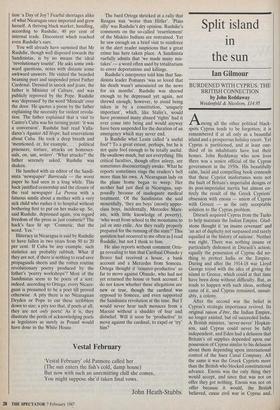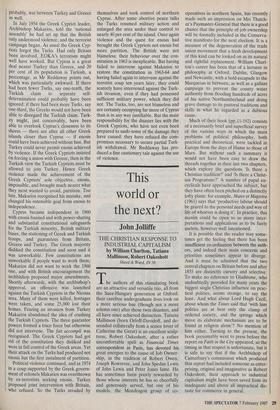Split island in the sun
Ian Gilmour
BURDENED WITH CYPRUS: THE BRITISH CONNECTION by John Reddaway Weidenfeld & Nicolson, £14.95 Among all the other political black- spots Cyprus tends to be forgotten; it is remembered if at all only as a beautiful island and a prosperous holiday resort. Yet Cyprus is partitioned, and at least one- third of its inhabitants have lost their homes. John Reddaway who now lives there was a senior official of the Cyprus government in the 1950s. His beautifully calm, lucid and compelling book .contends that these Cypriot misfortunes were not the fault of Britain's imperialist designs or its post-imperialist inertia but almost en- tirely the result of the Greek Cypriots' obsession with enosis — union of Cyprus with Greece — as the only acceptable solution to the Cyprus problem.
Disraeli acquired Cyprus from the Turks to help maintain the Indian Empire. Glad- stone thought it 'an insane covenant' and `an act of duplicity not surpassed and rarely equalled in the history of nations'. Neither was right. There was nothing insane or particularly dishonest in Disraeli's action; equally the possession of Cyprus did no- thing to protect India or the Empire. During and after the 1914-18 war Lloyd George toyed with the idea of giving the island to Greece, which could at that time have been done without difficulty. But, as tends to happen with such ideas, nothing came of it, and Cyprus remained, unsuit- ably, a colony.
After the second war the belief in Cyprus's strategic importance revived. Its original raison d'être, the Indian Empire, no longer existed, but oil succeeded India. A British minister, 'never-never' Hopkin- son, said Cyprus could never be fully independent, and Eden had a delusion that Britain's oil supplies depended upon our possession of Cyprus similar to his delusion about them depending upon international control of the Suez Canal Company. All the same it was the Greek Cypriots more than the British who blocked constitutional advance. Enosis was the only thing they would accept, and since that was not on offer they got nothing. Enosis was not on offer because it would, the British believed, cause civil war in Cyprus and, probably, war between Turkey and Greece as well.
In July 1954 the Greek Cypriot leader, Archbishop Makarios, told the 'national assembly' he had set up that the British only understood violence; and the terrorist campaign began. As usual the Greek Cyp- riots forgot the Turks. Had only Britain been involved, EOKA's terrorism might well have worked. But Cyprus is a great deal nearer Turkey than Greece, and 20 per cent of its population is Turkish, a percentage, as Mr Reddaway points out, which was particularly awkward. If there had been fevier Turks, say one-tenth, the Turkish claim to separate self- determination could probably have been ignored; if there had been more Turks, say one-third, the Greeks would not have been able to disregard the Turkish claim. Turk- ey might, just conceivably, have been able to overlook Cyprus's closeness to its shores — there are after all other Greek islands closer than Cyprus — if enosis could have been achieved without fuss. But Turkey could never permit enosis achieved by violence. If the Greek Cypriots insisted on forcing a union with Greece, then in the Turkish view the Turkish Cypriots must be allowed to join Turkey. Hence Greek violence made the achievement of the Greek Cypriots' sole objective, enosis, Impossible, and brought much nearer what they most wanted to avoid, partition. Too late, Makarios recognised his mistake, and changed his ostensible goal from enosis to independence.
Cyprus became independent in 1960 with enosis banned and with power-sharing and substantial constitutional safeguards for the Turkish minority, British military bases, the stationing of Greek and Turkish troops, and guarantees from Britain, Greece and Turkey. The Greek majority disliked the constitution and soon said it was unworkable. Few constitutions are unworkable if people want to work them; Makarios did not want to work the 1960 one, and with British encouragement the archbishop proposed major amendments. Shortly afterwards, with the archbishop's approval, an offensive was launched against the Turkish Cypriots in the Nicosia area. Many of them were killed, hostages were taken, and some 25,000 lost their homes. Fearing an invasion from Turkey Makarios abandoned the idea of crushing the Turkish Cypriots. The three guarantor powers formed a truce force but otherwise did not intervene. The fait accompli was recognised. The Greek Cypriots had got rid of the constitution they disliked and were in full control of the Greek areas. Yet their attack on the Turks had produced not enosis but the first instalment of partition.
Political violence continued, and in 1974 in a coup supported by the Greek govern- ment of colonels Makarios was overthrown by ex-terrorists seeking enosis. Turkey proposed joint intervention with Britain, who refused. So the Turks invaded by themselves and took control of northern Cyprus. After some abortive peace talks the Turks resumed military action and enlarged the area under their control to nearly 40 per cent of the island. Once again violence and the quest for enosis had brought the Greek Cypriots not enosis but more partition. The British were not blameless: their behaviour over the con- stitution in 1963 is inexplicable. But having failed to intervene against Makarios to restore the constitution in 1963-64 and having failed again to intervene against the terrorist coup ten years later, they could scarcely have intervened against the Turk- ish invasion, even if they had possessed sufficient military power, which they did not. The Turks, too, are not blameless and are certainly occupying far more of Cyprus than is in any way justifiable. But the main responsibility for the disaster lies with the Greek Cypriots, who have not even been prepared to undo some of the damage they have caused: they have refused the com- promises necessary to secure partial Turk- ish withdrawal. Mr Reddaway has pro- duced a fine cautionary tale against the use of violence.



















































 Previous page
Previous page